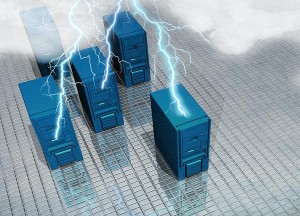In “When Lightning Strikes – Protecting Your Business Network from Thunderstorms Part I” we discussed steps you can take to safeguard your business network and computers from lightning strikes. In Part II, we discuss ways to protect your business crucial data.
Not only can a lightning strike damage computers if they aren’t properly grounded or protected by higher-end surge protectors, a lightning strike can also cause simultaneous failures that can destroy data on your computers or business network. Unfortunately, if there’s smoke wafting out of your computer, data protection strategies like RAID or disk mirroring do very little. To protect your computer or business network data you need to have it duplicated offsite with a backup. This is why many companies are turning to cloud backup.
Many small or home-based businesses back up their data and store their backup in another location like someone else’s home. This can be done using thumb drives or external hard drives. However, large amounts of data demand a variety of ways to backup data offsite. This includes carrying the copy of a backup offsite, using Internet-based backup or an automatic replication on a private backup system at another office. In some cases, large organizations need a higher capacity Internet connection to back up or restore large amounts of data to other locations.
Whether lightning strikes or not, on a daily basis, the goal is to keep your business network functioning. Let’s face it, disruptions to the network cost time, and time is money. Disruptions to your network cost you sales and customer service activity. A non-functioning network may cause certain staff to not meet important deadlines. This is why it’s important to do everything you can to prevent your network from shutting down and losing all communications. If you seek IT help because of routine work interruptions, you know a lightning strike is a situation you want to avoid.
On the other hand, you may recognize that you don’t want to be the keeper of your business network. You don’t have the time or interest though you know it’s important. This is when many businesses turn to cloud-based email, file storage and hosted phone systems that are outsourced to their Internet-based service providers. Done with someone you trust, there’s a peace of mind that comes with knowing your software maintenance, security risks, and financial risks have been addressed and taken care of.
In some parts of the country, lightning strikes are so common that businesses keep spare modems on hand, especially when the nature of the business revolves around its high-speed Internet connection. Keeping spare modems on hand is relatively inexpensive and critical to business.
Or, you could also opt for a second Internet connection in the event that one is damaged. Many businesses have put half their registers credit card terminals on one connection and the others on another. If and when one goes out, they can continue operating and make sales with half their registers while they’re waiting to restore the other half of registers.
When it comes to lightning strikes, it’s not a matter of if, but when. Grounding, surge protection, and preparation when it comes to guarding data and the operation of your business network are up to you. One size does not fit all. A Clarus Communications consultant can help protect your business network and data with cloud computing and a variety of other options that work best for your organization. Click here all us at 855-801-6700 to speak with one of our knowledgeable staff. We would be happy to find the best possible solution for you.

